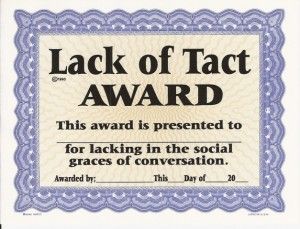Emotional Intelligence
My Attempt to Learn How to Be Tactful
How I developed (some) emotional intelligence.
Posted May 5, 2014

I used to think it’s good to impress people, including bragging. After all, my mother bragged about me to her friends. And I assumed it was kind to give advice, even if unasked for.
No surprise, many people disliked me and I thought it was their fault. Now it’s finally entering my thick skull that I’m dealing with people, not computers. While a computer reading my resume would be impressed if I bragged and would welcome an unwanted fix, that’s not true of most people.
So these are my still occasionally unfollowed rules of behavior. If you already have good emotional intelligence, they may all seem obvious but maybe they’ll be of some help to my emotionally tone-deaf brethren.
- Listen more than talk. For example, in a two-person conversation, speak 30 to 50 percent of the time. And keep your utterances short: The first 30 seconds, your light’s green, second 30 seconds yellow, and after that, red unless you’re telling a fascinating story—rarer than most speakers realize.
- Before saying a word, ask yourself, “How would this make the person feel?” True, occasionally, it’s worth slamming a person from complacency but you may pay too big a price. So, like a drug with side effects, you want to minimize its use. You’re safest making others feel good: listening patiently, nodding, agreeing, praising, amplifying, asking “Tell me more. I’m interested,” and saying or writing thank you.
- When you have to criticize, couch it in face-saving terms like, “I’m not sure I’m right but I’m wondering if (insert your slam.) What do you think?
- Avoid unnecessary conflict. Debates on emotional topics like politics, religion, race, gender, and economics rarely change anyone’s mind. They usually generate more heat than light, unfortunately.
- When you want something, don’t necessarily ask for it. Instead, consider asking the person whether s/he thinks it’s worthy. People will more likely give you what you want if they believe they generated the idea rather than giving in to your pressure. For example, let’s say you’d love a job lead from someone. Instead of asking for it, you might ask what they think of your resume.
I worry that America is too addicted to tact, too resistant to criticism. Growth is abetted by benevolently derived criticism. But that’s unlikely to change, so it is, alas, usually wise to err on the side of tact than of unbridled candor.
Marty Nemko was named “The Bay Area’s Best Career Coach” by the San Francisco Bay Guardian and he enjoys a 96 percent client-satisfaction rate. In addition to the articles here on PsychologyToday.com, many more of Marty Nemko's writings are archived on www.martynemko.com. Of his seven books, the most relevant to readers of this blog is How to Do Life: What They Didn’t Teach You in School. Marty Nemko's bio is on Wikipedia.


